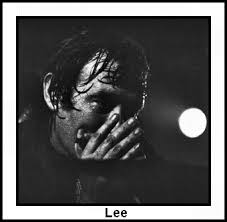Most people I know have fairly meaningful pictures on their phone home screens, of loved ones or loved things. I do too, and someone asked me the other day what it was. The picture’s at the top of this blog.
For those of you under the age of thirty or over the age of sixty, you might not recognise the face that is Lee Brilleaux. If you’re between those ages, and claim to have any sort of knowledge of contemporary music, and still don’t recognise him, then you need to listen up, particularly, if you recognise this picture:
Because it is the Emu’s task in hand today to convince you, gentle reader*, that Lee Brilleaux is more important to you, your life and the whole wide world of modern music than Kurt Cobain. A fairly random challenge, you might think, but one of the objections that I have against Mr Cobain, was that he inconsiderately killed himself the same week that Mr Brilleaux passed away. Not that either of them would know, but the reality is that when that happened, all we heard about was Cobain’s death, and Brilleaux’s was relegated to a footnote, if that.
Cobain’s death was April 5th, 1994, Brilleaux’s was a couple of days later, and I mention it now, because the sharp-minded amongst you will understand that we’re headed, like a very predictable train, towards the 20th anniversary. And if there’s one thing that our media industry likes a lot, it’s an anniversary. So, I’d predict that we’ll have lots and lots of 20th anniversary and hand-wringing retrospectives on Nirvana and the tragic life of Kurt Cobain, and I’ll not mind**, but in amongst there, I’d really like to see a bit of time spent on what Lee Brilleaux was all about.
I’ll admit to being slightly biased here. I was lucky enough to meet Lee a few times, and was in bands that supported Dr Feelgood a number of times on what looked like a fairly non-stop tour from the mid 70s through to the late 80s. Quite apart from the fact that he was charming, friendly and funny, he was also the best front man that a band could ever have. When he was on stage, you just could not take your eyes off of him, not because he was going to start turning cartwheels or wow us with some sort of genius quip, but because, well, his presence. Look at this clip from 1975 and you’ll see what I mean.
Now watch it again (probably from about 1:40, and count the number of times he or Wilko actually blink. Perhaps we couldn’t take our eyes of Dr Feelgood because they wouldn’t take their eyes off us.
Incidentally, those of you not familiar with the story of Dr Feelgood will also not be aware of the legendary white suit, which apparently started most tours relatively new and ended up in this sort of a state, after being covered in beer, sweat and the sort of stains you get by trying to mend the exhaust on a transit van. Which, apparently, he did.
Anyway, as a front man, he had very few peers. And even if you were to argue that there’s lots of really good front men about, you’d still be missing the point of what LB was about. If you listen to the Feelgood live album Stupidity, from 1976, you’ll start to understand a bit more. You also need to remember that, for most people, this was before punk, before new wave, before grunge, and at a time when people associated energetic music with Leo Sayer or Cat Stevens, or the Osmonds.
That highly charged, rehashed blues that they were playing must have been absolutely awesome to witness. I’m pretty confident in saying that, because so many of the interviews of the punk and new wave bands from the mid-late 70s cite Dr Feelgood as a huge influence. Added to which, you’ve got Brilleaux loaning Jake Riviera and Dave Robinson £500 to start Stiff records. And for those of you who spent the late 1970’s living under a stone, Stiff was the anti-label that launched the careers of Ian Dury, Elvis Costello, The Damned, Lene Lovich, Wreckless Eric and many many more. And without that lot, I’d respectfully suggest that the fabulous music (as opposed to the crud) that followed wouldn’t have happened. Admittedly, without Lene Lovich we might have been spared the miniaturised aural car crash that we know these days as Bjork, and without Wreckless Eric we’d have blissfully missed Will Ferrell belting out The Whole Wide World in ‘Stranger Than Fiction’. But pretty much anyone with an ounce of credibility in British music since could trace part of their songwriting and attitudinal roots to that legacy.
Finally, nothing against Mr Cobain, but this is rock and roll, right? And in my view, that’s about dancing and drinking and sex and drugs rather than thinking you’re the first person in the world ever to feel sorry for themselves. So Lee’s picture stays on my phone until April. And in the meantime, I’ll keep listening and loving it, and I very much hope you will too.
Until the next time, onetwothreefour!
* evening dear. I’ll be home in about an hour
** see what I avoided there?


